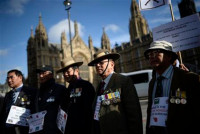National
TJ Act amendment draft: 20-year jail for guilty of murder, disappearance
A draft of the first amendment to the Enforced Disappearances Enquiry, Truth and Reconciliation Commission Act 2014 proposes a maximum of 20 years of jail for the perpetrators of murder and disappearance.
Dewan Rai
A draft of the first amendment to the Enforced Disappearances Enquiry, Truth and Reconciliation Commission Act 2014 proposes a maximum of 20 years of jail for the perpetrators of murder and disappearance.
Similarly, the draft proposes a 15-year jail term and a fine of Rs 500,000 for those found guilty of rape.
A copy of the draft obtained by the Post has also defined killings, enforced disappearance, rape and sexual abuse and torture as incidents of grave human rights violation.
The draft also criminalises acts of disappearance and torture and has a provision of slapping the perpetrators with a fine of Rs 200,000, which will be given to the victims.
The draft has been prepared at a time when the government and political parties have drawn flak for failing to ensure accountability for human rights abuses committed during the decade-long insurgency. The 1996-2006 armed struggled claimed more than 13,000 lives and left hundreds of thousands displaced and thousands disappeared.
The promises to settle the war-era cases have largely remained unfulfilled amid political bickering, leaving the conflict victims on tenterhooks.
The draft is likely to be sent for approval in a day or two, and a legislation to this effect would be a step forward in taking the transitional justice process, which has been dragging on for the last one decade, forward.
Two transitional justice commissions, whose terms are set to end on February 10, were formed under legislation that allows perpetrators amnesties.
Supreme Court orders to amend the legislation to bring it in line with Nepal’s obligations under international law have been largely ignored so far, much to the chagrin of conflict victims and rights activists.
The new draft prohibits the two transitional justice bodies from recommending amnesties to perpetrators of crimes of grave nature. Hence, once approved, it would offer a glimmer of hope for conflict victims who have been waiting for justice for the last one decade.
The two commissions—Truth and Reconciliation Commission (TRC) and the Commission of Inquiry on Enforced Disappeared Persons (CIEDP)—are likely to get an extension of one year as per the existing provision, but they have long been pressing for required legislation that would allow them to complete their tasks of addressing the victims’ grievances.
In December 2015, the TRC had asked the government to categorise which of the nine incidents of serious human rights violations mentioned in the act are “serious crimes” and “crimes of serious nature”.
The existing law mentions looting, seizure, breaking or arson of private and public property and forceful eviction from house and land or displacement by any other means as “serious crimes”. The amendment bill has categorised these crimes as “other incidents of rights violation”.
Similarly, in February 2016, the CIEDP had forwarded a draft bill on criminalising the act of disappearance as a prerequisite for it to start investigation.
The government is yet to respond.
The TRC has received around 60,000 complaints while the CIEDP has to look into around 3,000 complaints.




 13.16°C Kathmandu
13.16°C Kathmandu















